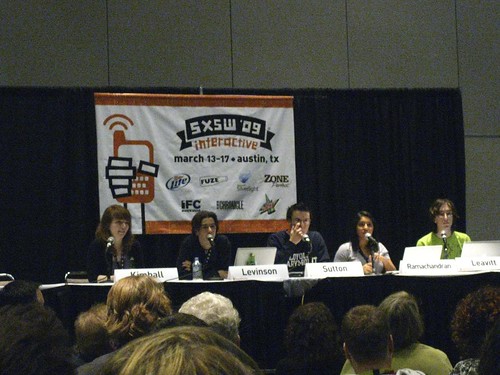Last Thursday, Alex and I were lucky enough to be interviewed by Steve Hargadon for the Future of Education interview series. The experience was quite remarkable, in a number of ways; our conversation felt a like a tele-unconference, with everyone bringing ideas and energy and questions to the table, thoughtfully pursuing answers. The full audio of the interview and the parallel chat transcript are now up at The Future of Education. We had a compact but enthusiastic set of teachers in the audience, listening live, and I was transfixed watching their comments fly by on the backchannel. The audience members responded to and augmented our interview in real-time. As a result, so did we.
My mind has been racing recently, trying to see the bigger picture here. Working on the Digital Natives Project means that I have quite a distorted view of reality: everyone I encounter through it is at least trying to understand “what’s going on with kids today and technology.” If they weren’t trying, they never would have stumbled upon this project in the first place. One aspect of our interview with Steve, actually, was something that Sarah and I encountered in the Born Digital book talk at Google DC, too: as Digital Natives, we’re often asked to answer for our generation/population. “Can you really focus on instant messenger and class at the same time?” “Is there anything worthwhile on the Internet at all?” and “Do students even read books anymore?” are all very serious questions, often asked with a hint of alarm. More often than not, in interviews as on this blog, we end up answering these questions from personal experience.
But if the picture I get of educators today is skewed by selection, the picture that Sarah and Alex and I can draw of students today is severely distorted, as well. All of us, as Digital Natives interns, think the Internet is great, an incredible tool; we’ve all had more positive than negative experiences on it. We wouldn’t be interns on the project otherwise! We’re invested in convincing other people that technology can be great, too. In the pursuit this persuasion, though, I know I often obscure the hard work and serendipity that goes into making the Internet a safe and educational place. During the interview with Steve, I mentioned that I spent 4 or more hours per day on instant messenger in middle school and high school. Sometimes, much more than 4 hours. It was truly consuming, and really did affect other aspects of my life negatively. But one day in high school, I just decided that I was giving it up. I didn’t log on for a month; when I returned, it seemed somehow less compelling than it once had. The next year, I gave it up for another month. After that, I never really felt like going back. Through a spontaneous act of willpower, a serious timesink was suddenly just no longer a part of my life.
I sometimes look back on all the hours I spent instant messaging, and wonder what I learned from them. So many hours wasted! Well, maybe. I was in middle school, after all. I was trying desperately to figure out my identity, my writing style, my social circles. Not only did instant messenger allow me to experiment with those things, it also gave me a way out of the insular social circles and popularity contests of my schooldays. Through the internet, I (cautiously) made friends with far-away bloggers who wrote about music and their interesting lives. To this day, we remain close friends. I’d be hard-pressed to say the same about my middle school lockermates and classmates.
At an even more basic level, I know that my early days of instant messenger meant that my typing improved dramatically and fast. No typing class could have sped up my words per minutes more effectively than the desperate desire to communicate with a crush or a new friend over instant messenger. So that’s the thing: even habits that appear to be horrifying timesinks often have peripheral, invisible benefits. Preteens eventually become twentysomethings; they won’t be on Club Penguin forever. Though they are, admittedly, likely to transfer their allegiances to a service like Facebook or MySpace, the point is that growing up itself demands a series of habit inventories. Some things, you just outgrow. There comes a moment of decision, when you decide to transition to something new. As habits evolve, though, whatever unpredictable skills were gained from previous fads don’t just fade away. If a kid obsessed with MySpace comes away from her teenage years with a little more knowledge of HTML, that is all to the good. It doesn’t necessarily work that way. But sometimes, it does.
If you read this blog regularly, these ideas should come as no surprise. But since the questions keep coming up, I thought I’d address them outright. Sarah’s, Alex’s, and my experiences are all, we hope and believe, examples of the Internet gone right. Since we so seldom hear about the Internet going right, I wanted to pause for a moment to point out that even when it looks like it’s temporarily going awry—when all of a sudden, technology or a social network or anything else online becomes an all-consuming obsession—there may be important things happening in the background. Those are worth our attention. In the end, they might well be worth the students’ obsession. As parents and educators, though, this isn’t just “wait and see.” It’s “wait and see and give young people the benefit of the doubt, and talk about things along the way.” At many points in my life, a conversation with a respected adult has been the tipping point in deciding to change a habit. If those conversations aren’t actively pursued, they might not ever happen. If they do, they may become their own antidote to alarmism.
Thanks again to Steve Hargadon for such a thought-provoking interview. The Future of Education talk is available here.
On the topic of peripheral knowledge gains, I found this article on social networks as learning tools extremely illuminating.
And finally: Alex and I will be speaking at SXSW Interactive this Sunday, on Blackboards or Backchannels: The Techno-Induced Classroom of Tomorrow. If you happen to be in Austin at SXSW, we hope to see you there!








 To put into perspective how wildly speculative it is to talk about “rewiring” the brain, as
To put into perspective how wildly speculative it is to talk about “rewiring” the brain, as 